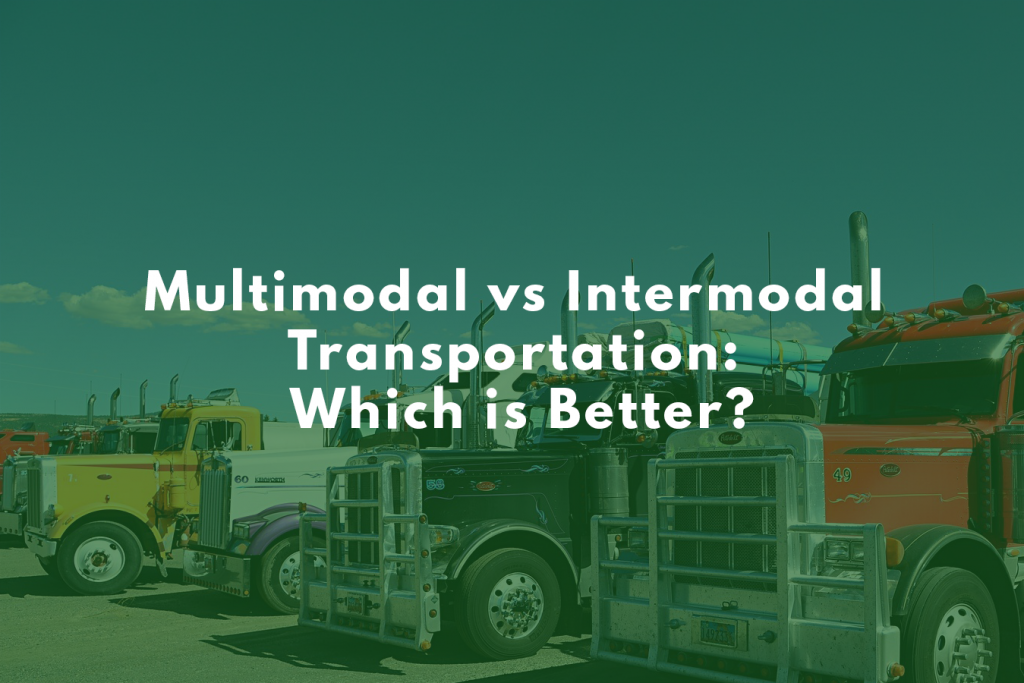There’s a fine line that separates intermodal and multimodal transportation. It’s nearly indiscernible; both are used as a means of cargo transportation and to determine the best transportation route while utilizing transport carriers in order to get deliveries from door to door.
In short, intermodal shipping utilizes several different contracts throughout the span of a transportation journey, which means shippers independently sign contracts with sea, air and land services. Multimodal, on the other hand, looks nearly identical, but comes with a major caveat: it uses one contract all the way through the journey.
Ultimately, there isn’t one better option when it comes to intermodal and multimodal transport. In many ways, these two methods are competitive and both offer pros and cons for different organizations.
What is Intermodal Transport?
Intermodal transportation is a common method of freight shipping which incorporates two or more means of transportation.
While the combination of shipping methods depend on the needs of the shipper, the shipped goods would typically be moved across truck, rail, maritime and air systems. A truck will load the cargo into an intermodal container and deliver it to the next means of transport, remaining unopened until it arrives to the consignee. Each leg of the journey is likely handled by a different specialized contractor.
Intermodal transportation has some key benefits:
- Containerization: Using an intermodal container eliminates direct handling of the cargo between pick up and delivery. These metal containers are of standardized sizes and extremely durable, ensuring your cargo will be protected.
- Intermodal Contracts: Multiple contracts with different contractors allow for negotiation and the shippers selection of their preferred methods and costs. This gives the shipper the most control over the entire process.
- Fuel Efficiency: Intermodal transport allows the shipper to ensure the route their cargo travels is the most fuel efficient. This can result in lower overhead costs and a reduced environmental impact.
What is Multimodal Transport?
Multimodal transportation uses largely the same method as intermodal shipping and has many of the same benefits, but the different advantages may mean multimodal is better for some shipments.
Containers carrying cargo are shipped using multiple means of transport and each leg of the journey. However, multimodal transportation is organized by one carrier rather than by multiple specialized contractors. Different companies may be involved if the carrier does not provide all service across the transport of the cargo, but they will handle all contracts and negotiations. This carrier, called a multimodal transport operator, or MTO, will be legally responsible for the cargo across its entire journey.
Multimodal benefits include:
- Multimodal contract: One single contract reduces the amount of time and paperwork dedicated to the shipping of cargo. A multimodal contract often means less of a headache, and any delays or issues during the process will be taken care of by the contractor.
- Multimodal transport operator: The MTO will be liable for any unexpected costs or damages incurred during shipping. Though modern intermodal shipping is very safe, multimodal shipping will allow the shipper even more peace of mind knowing that they won’t need to wrangle multiple companies to address any problems should they occur.
Multimodal vs. Intermodal: Shipping Benefits
Intermodal transportation offers the opportunity to reduce costs if handled properly, but many shippers prefer not to spend their time or manpower planning out an efficient intermodal route, or may have difficulty doing so. Multimodal relieves the shipper of this burden, but may cost more due to routes chosen at the preference of the MTO. Still, because of the need for insurance on each individual contract, intermodal transportation could end up costing more if handled inefficiently.
Intermodal allows the shipper to choose which contractors are handling their cargo, giving more control over the quality and safety of the shipping.
Multimodal leaves these choices to the MTO, but assures the shipper that they will have minimal responsibility in solving an issue if something happens to go wrong. Additionally, multimodal transportation is more direct that intermodal, so shippers may prefer this option when shipping high value cargo.
Both options can be speed efficient. Multimodal is generally chosen when speed efficiency is more important than cost efficiency, as specialized agents will plan the best routes. Intermodal can be as fast or faster than multimodal, depending on the priority of the shipper, but planning out a route that is both fast and cost efficient can be a daunting task.
Need some help deciding which to use — or anything else? Just get in contact with us! As expert customs brokers, we can guide you through any part of the process.






